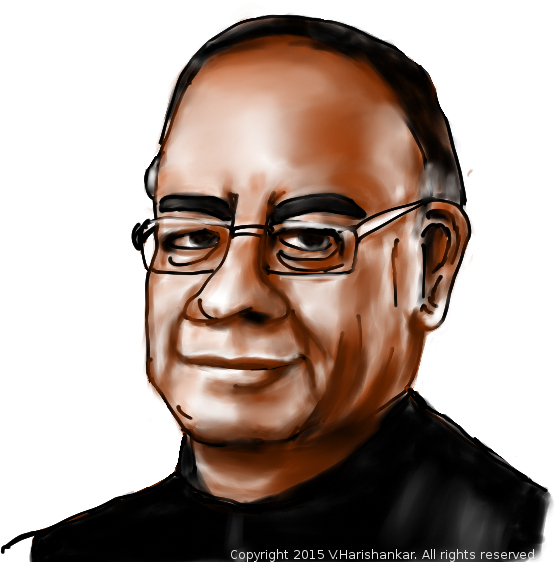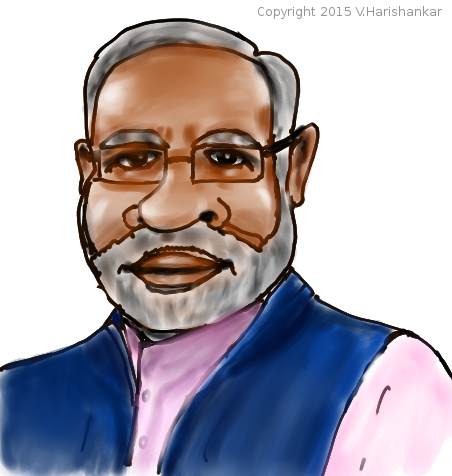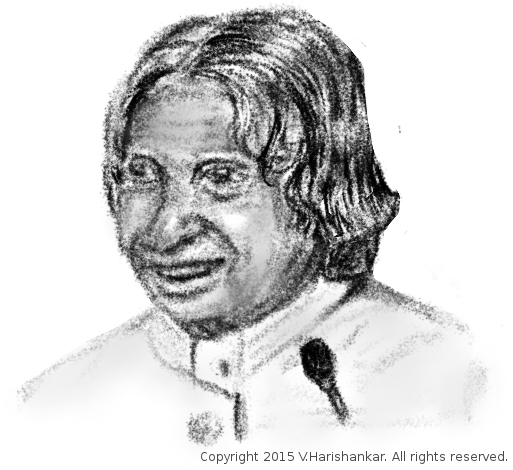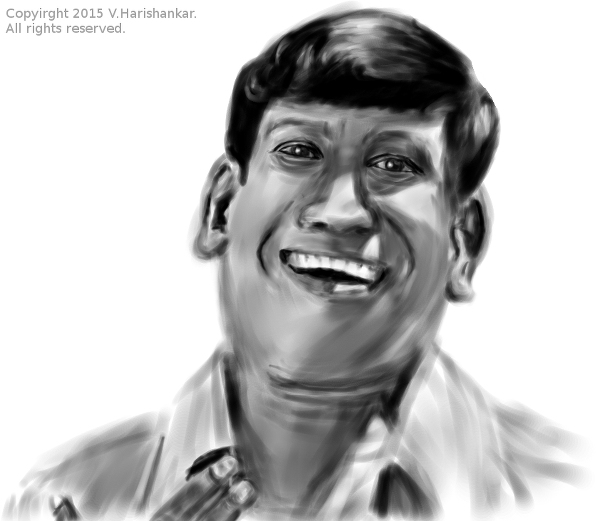A caricature of Shri Arun Jaitley, Finance Minister of India and BJP leader.

Filed under:
Artwork/Portraits/Caricatures by
Hari
Posted on Sat, Aug 22, 2015 at 21:20 IST (last updated: Sat, Aug 22, 2015 @ 21:20 IST)
A caricature of Shri Arun Jaitley, Finance Minister of India and BJP leader.

Filed under:
Artwork/Portraits/Caricatures by
Hari
Posted on Thu, Aug 20, 2015 at 21:31 IST (last updated: Thu, Aug 20, 2015 @ 21:31 IST)
A cartoon caricature of Narendra Modi, Prime Minister of India

Filed under:
Artwork/Portraits/Caricatures by
Hari
Posted on Wed, Aug 19, 2015 at 20:33 IST (last updated: Wed, Aug 19, 2015 @ 21:44 IST)
Portrait of Anushka Shetty, south Indian film actress.

Filed under:
Artwork/Portraits/Caricatures by
Hari
Posted on Sat, Aug 15, 2015 at 20:24 IST (last updated: Sat, Aug 15, 2015 @ 20:24 IST)
Another quick portrait.

Filed under:
Artwork/Portraits/Caricatures by
Hari
Posted on Fri, Aug 14, 2015 at 17:56 IST (last updated: Fri, Aug 14, 2015 @ 18:01 IST)

Portrait after a long time. This time of Actor Vadivelu.
Filed under:
People and society by
Hari
Posted on Sun, Jul 12, 2015 at 18:40 IST (last updated: Sun, Jul 12, 2015 @ 21:45 IST)
Who steals my purse steals trash; 'tis something, nothing;
'Twas mine, 'tis his, and has been slave to thousands;
But he that filches from me my good name
Robs me of that which not enriches him,
And makes me poor indeed.
-- William Shakespeare (in Othello)
In an earlier blog post of mine, I lauded the Supreme Court for upholding freedom of speech by striking down section 66-A of the Information Technology Act, 2000 on the ground of arbitrariness and potential of abuse. Although I firmly believe that free speech must be protected at all costs, I also think that there are limits beyond which unrestricted irresponsible speech can cause immense harm to individuals and to society. Like the wise jurists who decided that certain kinds of speech cause more harm than good to society and ought to carry penal liabilities, I think it is important to protect certain rights at the cost of other rights.
One of the rights that I staunchly defend is the right to reputation. No man has the right to sully another's hard-earned reputation without just cause. It takes a lifetime to build a good reputation but the same reputation can be destroyed by making just one accusation widely published and transmitted. In this age of internet and social media, there are plenty of champions of free speech but few champions of the right to reputation. I cannot imagine why the world is so messed up that people think that one should be allowed to publish and spread harmful and irresponsible statements without criminal consequence. After all, hate speech is still a crime in many parts of the world: inciting hatred and violence against a particular ethnic group, or a minority section of society is a punishable offence.
Well, in my opinion, libel or slander is one kind of hate speech that is targetted at an individual rather than a group or part of society. One can make all kinds of accusations against individuals that cannot be made against an entire group, but the effect on the individual can be far more devastating than to a group that is the target of hate speech. Consider how an individual's life can be ruined by slander or libel: a mere accusation of crime is enough to land a person out of a job. Even if cleared of criminal charges later on, the stigma caused by the accusation will ensure that the person cannot find another job easily.
Loss of reputation can lead to loss of trust, loss of respect, loss of dignity (which is inherent in right to life as upheld by the Supreme Court of India), loss of privacy, loss of a job, business or professional status, social stigmatization and can cause immense mental agony to the person targetted. In addition, powerful and influential media houses are already very prompt in making wild accusations against individuals and groups. It's next to impossible for a single individual to stand up to such hostility, unless that individual has huge resources at his/her command. Media publications can hang a man on a bare accusation without basis because that is what sells. And let us not forget how quickly the social media can actually tarnish somebody's reputation in a matter of hours without even the target being aware of the fact.
In the face of all this, the individual is left with no way to defend his/her reputation but to take legal action. Civil penalties (theoritically) may not be sufficient to deter somebody with deep pockets or influence from tarnishing the reputation of a lesser individual, but the fear of criminal action does have a certain effect, even among influential sections of society. In India, civil law is no deterrent to mischief. In my book, nothing short of the fear of arrest and criminal prosecution can tighten up loose tongues that do more harm than good in the name of freedom of speech. The excuse that criminal defamation laws can be misused should not hold water, since the same logic can be applied to any other law deemed to be strict or harsh. Besides reputation is not something equally important to every person. A person with far less to lose by way of loss of reputaion can use it as a weapon against somebody more vulnerable from its loss. There is no use saying that freedom of speech works both ways in such situations, since it does not affect everybody equally. It is also a fact that reputation is crucially important in some professions and positions than others. In fact, I would go on to say that even criminal law is impotent against sustained attempts to tarnish somebody's reputation. I wouldn't mind even going back to the medieval methods of enforcing personal rights: allowing a victim of slander or libel to legally challenge his defamer to a one-on-one duel with weapons of the victim's choice.
The argument that reputation is something that can withstand a false accusation is equally dubious. The public doesn't wait for a court's verdict to decide if a person is guilty of a crime or not. A mere accusation, cleverly framed can do enough damage on its own and undoing the damage can take a lot of pain and effort, besides time. Moreover there is no arguing that reputation is indeed fragile. For instance, even such a big and established brand like Maggi lost its reputation for being safe for human consumption within a few days of the news hitting national media even though a couple of generations have consumed it before. Even if Maggi is cleared eventually of being unsafe, the bad smell (figuratively) will stick to the brand for a long, long time. If a big, powerful company like Nestle struggles with Maggi's sudden loss of reputation, imagine how difficult it would be for an individual to repair his/her personal reputation
The fact is, defamation is a clear-cut exception to free speech and is well defined in law and by precedent. There are far fewer dangers that such well-established legal prinicples will cause damage to society than the dangers of unrestrained freedom of speech, including the right to defame another without criminal consequences.
I don't care much if many people don't agree with me. I always believe in principles over the opinion of the masses. I believe reputation is far more fragile and valuable than the right to freedom of speech and hence something to be safeguarded far more vigilantly than other rights. I go back to the quote at the beginning of this article. Loss of reputation is indeed a grievous, sometimes irreparable loss. Curtailing freedom of speech in a small, clear-cut, well-defined way is a small price to pay to protect the far more important and fragile right of reputation.